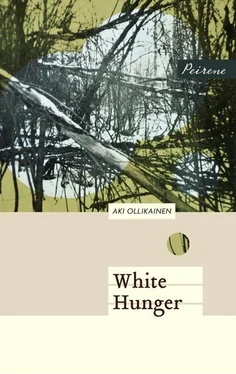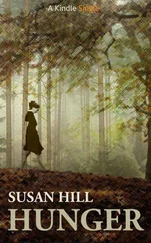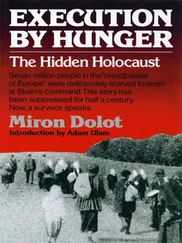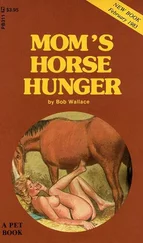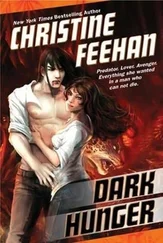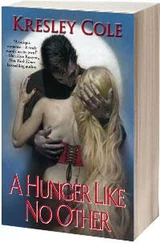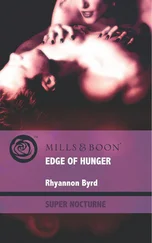Teo beckons to two thin men standing by the cemetery gate. He offers them a banknote. The taller of the two shoves the note into his breast pocket.
‘I fucking knew it, didn’t I?’ he snorts at his companion.
Matias offers Mrs Berg his arm and guides her through the gate.
Teo looks up at the sky. He would like to see a sign of Johan, or even God. But there is a grey carpet covering the firmament. If God is behind it, he is not looking at Finland, and Johan has not risen from his grave but lies instead in a wooden coffin, stones thumping against its lid like church bells proclaiming the end of a life. Only endless, dreamless sleep remains.
That is where Johan Berg is laid to rest, except there is no old friend resting there, but something that was once Johan Berg. The booming laugh he would let out, years ago, when he was sitting drunk at the table in the Green Villa, still echoes in Teo’s head, though ever more faintly.
And when Teo no longer hears it, there will be nothing left of Johan.
After coffee, sitting in comfortable armchairs, Teo and Matias light their pipes. The stove in the rectory parlour exhales a warmth that makes them forget the icy grave for a moment.
Teo tells Matias of the visit he made to a small cabin on his way here. When he went in, the farmer barely glanced at him from under his dark brows.
Teo tried to speak the man’s own language to him. When he failed to get a reply, Teo placed a banknote on the table. The man’s gaze moved along the bare surface towards it. When it reached the money, the man got up, retrieved a wooden box from the top of the stove, put it on the table and took out three identical notes. Then he sat down and stared at his money.
‘You eat yours, then I’ll eat mine,’ he grunted finally.
Teo was about to stand up and leave when from some dark corner a woman appeared and brought him a bowl of gruel. The man disappeared in a huff and did not come back for as long as Teo was there. The woman kept moving her hands about apologetically and plucking nervously at her apron. She then took the money, the man’s own and the note Teo had put on the table, and placed them in the box, which she lifted back into its hiding place. She turned to face Teo and curtsied. Teo, already on his feet, curtsied back, thanked her in Swedish by mistake and left.
Matias laughs at the story as if it were a funny anecdote. Teo, too, has to chuckle at the memory of the situation. All the same, he wonders how they can be touched by the surrounding misery, if they are merely amused by it. If they truly felt what was going on, would they still be able to laugh?
Instead of looking at others, as they should, they look in the mirror. Look, there is your neighbour, moulded by God in His own image. What you do unto him, you do unto God; serve him, therefore, and do what good you can.
What about Johan, what happened to him? Did the bear with his ready laugh — that manly, rumbling roar — turn into a gloomy, emaciated spectre? Did this reality touch Johan Berg with its cold fingers and rob him of all the joy he had in life?
In his last letters to Teo, Johan had reminisced about their shared student years, repeating the same old stories as if to convince himself of their reality. Despite all the amusing memories, the letters were gloomy. Or because of them: perhaps the contrast was so great that, as he wrote, Johan finally realized that all was now lost. Was Johan’s soul deadened by what he saw to be the reality, or by what he saw to be dead and gone?
The yellow wall takes up the entire length of the street. Marja walks under the windows. The wooden building resembles a fortress. Frost forms a thin, limp veil over the yellow paint, unable to penetrate the great house.
A man comes round the corner and leaps in front of Marja like a startled hare. His eyes bear the same expression as Pajula’s dog Peni after Lauri beat it senseless in a drunken rage.
Marja stumbles against the wall. Juho sways in time with his mother, like a branch that yields to the wind’s every whim.
The man loses his footing as he dodges Marja, but he manages to break his fall with one hand. He carries on crossing the street at the same speed, only on all fours. Three other men, who all look like landowners, catch up with him. One of them, who is dressed in wolf fur, grabs the man on all fours by his collar and tugs violently. The fugitive rears up like a horse. Then he slips, and slumps into his coat. The man in wolf fur flings him down as if he were a wild cat.
‘Thief, thief,’ croaks a woman in a blue shawl who has followed on the men’s heels.
A small shrivelled man with a droopy moustache pulls the coat half off the thief.
The thief looks at the moustached man in horror, presses his forehead to the snow and pants. He hunches his shoulders, as if expecting a blow. His pursuer digs out a lump of meat from inside the coat and holds it up like a trophy for all to see. Then, suddenly, he bashes the thief on the back of the neck with the meat. The man goes limp and just lies there. Not because of the blow, but because he has no strength to resist. The man with the moustache kicks him. Marja covers Juho’s eyes.
The woman in the blue shawl spots Marja and points at her with a long, thin finger.
‘There goes another beggar, meat thief, robber, whore,’ the woman shouts.
Marja squeezes Juho protectively, too hard. Juho tries to prise his mother’s hand away. He manages to peer through her fingers; he sees the man using his hands to drag himself forward. Bright-red blood trickles from his mouth.
The pursuers turn towards Marja. The man with the moustache merely glances over his shoulder before turning back to watch the flogged man crawling.
The stares are empty; they exude coldness. The woman in the shawl opens and closes her mouth. Marja sees her teeth, and the frozen breath rising from the woman’s mouth along with her words; she does not hear the voice. The town starts revolving slowly around her. Wolf fur steps closer.
‘Let her be. She’s got a child and all.’
The man’s words open Marja’s ears. After the moment of deafness, she hears the sounds of the town again. They roar in the emptiness inside her head, cause shooting pains behind her eyes, but then, finally, they settle down in their proper places. Wolf fur tells her there is an almshouse on the other side of the river, at the foot of the church hill. She should go there.
Marja cannot move her legs. She looks in the direction wolf fur indicated, then at his hand, and finally at his face. Instantly, she understands how idiotic she must appear. She begins to shiver with exhaustion.
Wolf fur picks up Juho. Marja is alarmed; she tries to stop the man but manages only to move a hand feebly in his direction.
‘Very well, I’ll take you there.’
It takes a moment for Marja to comprehend the man’s words. She calms down and her body stops trembling. The woman in the blue shawl is now standing next to the man, and she looks curiously at Juho.
‘Mr Gustafsson should take care. Could be the boy’s got something. Typhus.’
‘Could be. Could always be there, typhus.’
The man turns and begins walking. Juho stretches out his hand towards his mother.
‘Come on,’ Gustafsson orders.
Marja follows the mitten Juho extends. At the crossroads, she looks at the thief lying on the ground. The man with the moustache is already walking off, the lump of meat under his arm. The woman in the blue shawl runs to catch up with him and the man he is with. Having joined them, she looks back at Marja and Gustafsson and seems to be explaining something; she tugs at moustached man’s sleeve, but the men are more interested in the lump of meat than whatever it is the woman has to say.
Читать дальше
